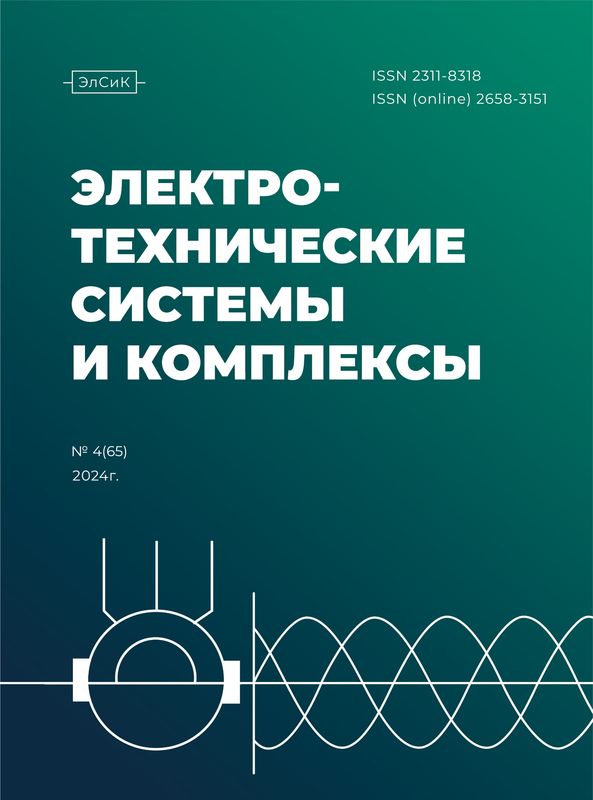Abstract
The development of modern electric power systems is associated with digitalization and an increase in the data flow from electric power facilities to the control centers. On the other hand, an increase in the renewable energy sources share leads to an increase in electrical modes uncertainty and a decrease in total inertia, which imposes new requirements on the speed of the procedure for assessing dynamic stability and emergency control. The application of traditional deterministic algorithms to the analysis of the dynamic stability of power systems in the presence of increased requirements for performance may turn out to be inefficient. To overcome the shortcomings of traditional methods for assessing the dynamic stability of power systems, artificial intelligence methods can be used. This class of methods has a significant speed of trained models and the ability to search for patterns in the data, which makes it effective in modern power systems. The paper presents the results of developing a method for assessing the dynamic stability of a power system based on artificial intelligence methods, taking into account the topological connectivity of the electrical network. The technique is based on the application of the gradient boosting algorithm for decision trees. Numerical simulation was performed on the IEEE39 model implemented in Matlab/Simulink; the Scikit-learn library of the Python3 programming language was used to implement machine learning algorithms. To train the machine learning algorithm the load angles of synchronous generators, voltage levels at the nodes connecting synchronous generators to the electrical network, the topology of the electrical network, the duration and resistance of the short circuit were used. As a result of applying the trained algorithm, taking into account the topology of the electrical network, an accuracy of 91.5% was obtained on the test sample. The accuracy on the test sample without taking into account the topological connectivity of the elements of the power system was 81.6%.
Keywords
Transient stability, artificial intelligence, machine learning, mathematical modeling.
1. Khalyasmaa A.I., Senyuk M.D., Eroshenko S.A. High-Voltage Circuit Breakers Technical State Patterns Recognition Based on Machine Learning Methods. IEEE Transactions on Power Delivery 2019, no. 4(34), pp. 1747-1756. doi: 10.1109/TPWRD.2019.2921095
2. Wang H., Huang X., Gao S., Yang Z., Gao T., Zhao Q., Ding H. Electric vehicle charging load clustering and load forecasting based on long short term memory neural network. 5th International Electrical and Energy Conference (CIEEC). IEEE, 2022, pp. 3196-3200. doi: 10.1109/CIEEC54735. 2022.9846570
3. Keerthisinghe C., Mickelson E., Kirschen D.S., Shih N., Gibson S. Improved PV Forecasts for Capacity Firming. IEEE Access. 2020, vol. 8, pp. 152173-152182. doi: 10.1109/ACCESS.2020.3016956
4. Gelli R., Manimaran G. Anomaly Detection and Mitigation for Wide-Area Damping Control using Machine Learning. Power& Energy Society General Meeting (PESGM). IEEE, 2020. doi: 10.1109/PESGM41954.2020.9281615
5. Hong G., Kim Y.-S. Supervised Learning Approach for State Estimation of Unmeasured Points of Distribution Network. in IEEE Access, vol. 8, pp. 113918-113931, 2020.
6. Dhibi K., Fezai R., Mansouri M., Trabelsi M., Kouadri A., Bouzara K., Nounou H., Nounou M. Reduced Kernel Random Forest Technique for Fault Detection and Classification in Grid-Tied PV Systems. IEEE Access. 2020, no. 6(10), pp. 1864-1871. doi: 10.1109/JPHOTOV.2020. 3011068
7. Beryozkina S., Senyuk M., Berdin A., Dmitrieva A., Dmitriev S., Erokhin P. The Accelerate Estimation Method of Power System Parameters in Static and Dynamic Processes. IEEE Access. 2022, vol. 10, pp. 61522-61529. doi: 10.1109/ ACCESS.2022.3181196
8. Hong T., Chen C., Huang J., Lu N., Xie L., Zareipour H. Guest Editorial Big Data Analytics for Grid Modernization. IEEE Transactions on Smart Grid. 2016, no. 5(7), pp. 2395-2396. doi: 10.1109/TSG.2016.2593358
9. Kundur P. Power System Stability and Control. McGraw-Hill, Inc., New York, 1994.
10. Alekseeva V. A. Use of machine learning methods in binary classification problems. Avtomatizatsiya protsessov upravleniya [Automation of control processes]. 2015, no. 3, pp. 58-63. (In Russian)
11. Dabou R.T., Kamwa I., Chung C.Y., Mugombozi C.F. Time Series-Analysis Based Engineering of High-Dimensional Wide-Area Stability Indices for Machine Learning. IEEE Access. 2021, vol. 9, pp. 104927-104939. doi: 10.1109/ ACCESS.2021.3099459
12. Chen K. Indirect PCA Dimensionality Reduction Based Machine Learning Algorithms for Power System Transient Stability Assessment. Innovative Smart Grid Technologies - Asia (ISGT Asia). IEEE, 2019, pp. 4175-4179. doi: 10.1109/ISGT-Asia.2019.8881370
13. Mi D., Wang T., Gao M., Li C., Wang Z. Online transient stability margin prediction of power systems with wind farms using ensemble regression trees. International Transactions on Electrical Energy Systems. 2021, no. 11(31). doi: 10.1002/2050-7038.13057
14. Liu T., Liu Y., Xu L., Liu J., Mitra J., Tian, Y. Non-parametric statistics-based predictor enabling online transient stability assessment. IET Gener. Transm. Distrib. 2018, vol. 12(21), pp. 5761-5769. doi: 10.1049/iet-gtd.2018.5802
15. Sarajcev P., Kunac A., Petrovic G., Despalatovic M. Power System Transient Stability Assessment Using Stacked Autoencoder and Voting Ensemble. Energies. 2021, no. 14(11), 3148. doi: 10.3390/en14113148
16. Shao D., Xu Y., Ma S., Jing Y., Sun W., Zhou T., Yang J. Transient Stability Assessment Method for Power System Based on SVM with Adaptive Parameters Adjustment. 4th International Electrical and Energy Conference (CIEEC). IEEE, 2021, pp. 1-6. doi: 10.1109/CIEEC50170.2021.9510574
17. Moulin L.S., da Silva A.P.A., El-Sharkawi M.A., Marks R.J. Support vector machines for transient stability analysis of large-scale power systems. IEEE Transactions on Power Systems. 2004, no. 2(19), pp. 818-825. doi: 10.1109/ TPWRS.2004.826018
18. Wang B., Fang B., Wang Y., Liu H., Liu Y. Power System Transient Stability Assessment Based on Big Data and the Core Vector Machine. IEEE Transactions on Smart Grid. 2016, no. 5(7), pp. 2561-2570. doi: 10.1109/TSG.2016.2549063
19. Mukherjee R., De A. Development of an Ensemble Decision Tree-Based Power System Dynamic Security State Predictor. IEEE Systems Journal. 2020, no. 3(14), pp. 3836-3843. doi: 10.1109/JSYST.2020.2978504
20. Baltas N.G., Mazidi P., Ma J., de Asis Fernandez F., Rodriguez P. A Comparative Analysis of Decision Trees, Support Vector Machines and Artificial Neural Networks for On-line Transient Stability Assessment. International Conference on Smart Energy Systems and Technologies (SEST). IEEE, 2018, pp. 1-6. doi: 10.1109/SEST.2018.8495872
21. Amraee T., Ranjbar S. Transient Instability Prediction Using Decision Tree Technique," in IEEE Transactions on Power Systems. 2013, no. 3(28), pp. 3028-3037. doi: 10.1109/ TPWRS.2013.2238684
22. Li N., Li B., Gao L. Transient Stability Assessment of Power System Based on XGBoost and Factorization Machine. IEEE Access. 2020, vol. 8, pp. 28403-28414. doi: 10.1109/ ACCESS.2020.2969446
23. Liu X., Min Y., Chen L., Zhang X., Feng C. Data-driven Transient Stability Assessment Based on Kernel Regression and Distance Metric Learning. Journal of Modern Power Systems and Clean Energy. 2021, no. 1(9), pp. 27-36. doi: 10.35833/MPCE.2019.000581
24. Pannell Z., Ramachandran B., Snider D. Machine learning approach to solving the transient stability assessment problem. Texas Power and Energy Conference (TPEC). IEEE, 2018, pp. 1-6. doi: 0.1109/TPEC.2018.8312089
25. Azman S.K., Isbeih Y.J., Moursi M.S.E., Elbassioni K. A Unified Online Deep Learning Prediction Model for Small Signal and Transient Stability. IEEE Transactions on Power Systems. 2020, no. 6(35), pp. 4585-4598. doi: 10.1109/TPWRS.2020.2999102
26. Hang F., Huang S., Chen Y., Mei S. Power system transient stability assessment based on dimension reduction and cost-sensitive ensemble learning. Conference on Energy Internet and Energy System Integration (EI2). IEEE, 2017, pp. 1-6. doi: 10.1109/EI2.2017.8245698
27. Li N., Li B., Gao L. Transient Stability Assessment of Power System Based on XGBoost and Factorization Machine. IEEE Access. 2020, vol. 8, pp. 28403-28414. doi: 10.1109/ACCESS.2020.2969446
28. Hou J., Xie C., Wang T., Yu Z., Lü Y., Dai H. Power System Transient Stability Assessment Based on Voltage Phasor and Convolution Neural Network. International Conference on Energy Internet (ICEI). IEEE, 2018, pp. 247-251. doi: 10.1109/ICEI.2018.00052
29. Zhou Y., Zhao W., Guo Q., Sun H., Hao L. Transient Stability Assessment of Power Systems Using Cost-sensitive Deep Learning Approach. 2nd Conference on Energy Internet and Energy System Integration (EI2). IEEE, 2018, pp. 1-6, doi: 10.1109/EI2.2018.8582047
30. Shinde B., Wang S., Dehghanian P., Babakmehr M. Real- Time Detection of Critical Generators in Power Systems: A Deep Learning HCP Approach. Texas Power and Energy Conference (TPEC). IEEE, 2020, pp. 1-6. doi: 10.1109/ TPEC48276.2020.9042552
31. Zhang S., Zhang D., Qiao J., Wang X., Zhang Z. Preventive control for power system transient security based on XGBoost and DCOPF with consideration of model interpretability. CSEE Journal of Power and Energy Systems. 2021, no. 2(7), pp. 279-294. doi: 10.17775/CSEEJPES.2020.04780
32. Li M., Wang L., Wang Y., Chen Z. Sizing Optimization and Energy Management Strategy for Hybrid Energy Storage System Using Multiobjective Optimization and Random Forests. IEEE Transactions on Power Electronics. 2021, no. 10(36), pp. 11421-11430. doi: 10.1109/TPEL.2021.3070393
33. Subrahmanyam S.V, Jain S.K., Narayanan G. Real-time Simulation of IEEE 10-Generator 39-Bus System with Power System Stabilizers on Miniature Full Spectrum Simulator. International Conference on Sustainable Energy Technologies and Systems (ICSETS). IEEE, 2019, pp. 161-166. doi: 0.1109/ICSETS.2019.8745001
Senyuk M.D., Dmitrieva A.A. Development of a Method for Assessment the Dynamic Stability of Power Systems on the Basis of the Theory of Artificial Intelligence Application Taking into Account the Topological Connectivity of the Network. Elektrotekhnicheskie sistemy i kompleksy [Electrotechnical Systems and Complexes], 2022, no. 4(57), pp. 12-19. (In Russian). https://doi.org/10.18503/2311-8318-2022-4(57)-12-19










